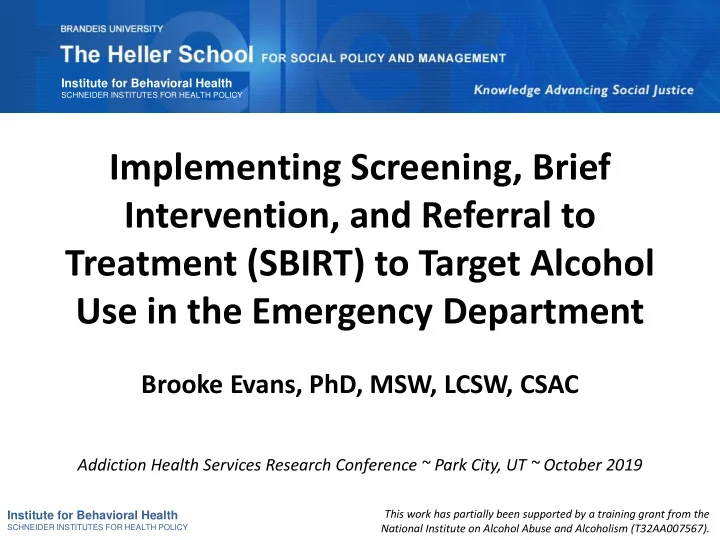

Institute for Behavioral Health SCHNEIDER INSTITUTES FOR HEALTH POLICY Implementing Screening, Brief Intervention, and Referral to Treatment (SBIRT) to Target Alcohol Use in the Emergency Department Brooke Evans, PhD, MSW, LCSW, CSAC Addiction Health Services Research Conference ~ Park City, UT ~ October 2019 This work has partially been supported by a training grant from the Institute for Behavioral Health SCHNEIDER INSTITUTES FOR HEALTH POLICY National Institute on Alcohol Abuse and Alcoholism (T32AA007567).
Study Partners Institute for Behavioral Health 2 SCHNEIDER INSTITUTES FOR HEALTH POLICY
Background • Unhealthy alcohol use is a serious public health concern and prevalent among patients seen in emergency department (ED) settings • SBIRT is a well-established screening and intervention framework to target unhealthy use • SBIRT is being widely adopted and implemented in a variety of medical settings, including EDs Institute for Behavioral Health 3 SCHNEIDER INSTITUTES FOR HEALTH POLICY
Study Objective • Given their role as a common entry point for patients into the health care system, ED settings present a unique opportunity for SBIRT implementation • This study assessed how EDs implemented the SBIRT process and factors associated with successful implementation Institute for Behavioral Health 4 SCHNEIDER INSTITUTES FOR HEALTH POLICY
Study Setting • Vermont Department of Health received SAMHSA SBIRT grant • Extended health reform efforts in the state • Implementing organizations provided with training, coaching, and ongoing support • Implementation occurred on staggered basis Institute for Behavioral Health 5 SCHNEIDER INSTITUTES FOR HEALTH POLICY
Study Methods • Mixed-method, multiple case study design • Included three regional medical centers that implemented SBIRT in the ED Data Sources: • Qualitative key informant interviews ( n =14) • Quantitative patient-level data ( n =41,797) Institute for Behavioral Health 6 SCHNEIDER INSTITUTES FOR HEALTH POLICY
SBIRT Model and Workflow Initial Secondary Brief Brief Referral to Screening Screening Intervention Treatment Treatment SBIRT SBIRT SBIRT Specialist model SBIRT clinician Triage nurse clinician clinician clinician (one site) (MA-level) (MA-level) (MA-level) (MA-level) SBIRT SBIRT SBIRT Specially trained SBIRT clinician clinician SBIRT clinician clinician paraprofessional clinician (BA/MA- (BA/MA- (BA/MA-level) (BA/MA- (two sites) (MA-level) level) level) level) Institute for Behavioral Health 7 SCHNEIDER INSTITUTES FOR HEALTH POLICY
Institute for Behavioral Health SCHNEIDER INSTITUTES FOR HEALTH POLICY Select SBIRT Implementation Findings Institute for Behavioral Health SCHNEIDER INSTITUTES FOR HEALTH POLICY
Implementation Rationale • Unhealthy alcohol use was a major impetus for bringing SBIRT into the ED “ It’s very simple. Practicing emergency medicine was incredibly frustrating when we could not help people who were presenting with an acute or subacute need of help that involved substance use, typically alcohol. That remains a very strong note that I continue to call out because it remains, I think, our most dominant need.” -Physician Champion Institute for Behavioral Health 9 SCHNEIDER INSTITUTES FOR HEALTH POLICY
Implementation Support • Importance of grant and technical assistance throughout implementation process and into sustainability Institute for Behavioral Health 10 SCHNEIDER INSTITUTES FOR HEALTH POLICY
SBIRT as Innovation “This [SBIRT] gave us a tool to screen for what we know is often high-risk behavior and it was structured. Then we had a way to act on it. So, it fit with the medical model of efficiency, ‘Hey, we can have them do this thing. We can interpret the results. We can engage with them about risk.’ … [SBIRT] was there, it was a structured automatic way to make it be part of our care.” - Physician Champion Institute for Behavioral Health 11 SCHNEIDER INSTITUTES FOR HEALTH POLICY
Acceptance of SBIRT Process • SBIRT was viewed by study informants as a “ beneficial ” clinical process: – To address alcohol use – Remedy gaps in care – Integrate substance use services into emergency medical settings – “Destigmatize” alcohol/other substance use – Improve patient satisfaction Institute for Behavioral Health 12 SCHNEIDER INSTITUTES FOR HEALTH POLICY
Other Implementation Factors • Strong multi-level leadership “I think you have to have strong leadership. …We just kept it up as a consistent drumbeat, an expectation, we’re not going back ... We’re doing this, and feeding in plain speech, plain language, why it’s important. And involving everybody.” - Physician Champion • Organizational culture/structure • Community characteristics Institute for Behavioral Health 13 SCHNEIDER INSTITUTES FOR HEALTH POLICY
Other Factors (Continued) • Buy-in and SBIRT model acceptance “Buy - in from staff and providers was gigantic, but you’ve got to work at it. It took time; you weren’t going to get instant buy - in.” -SBIRT Clinician “We embrace people who are coming to help our patients, so the buy-in was easy to convince the nurses and doctors to buy into this program because it’s all good. There’s no negative to it … when they're not tasked with the work. If someone else [i.e., SBIRT clinician] is going to come and do the work, absolutely. I think that helped make it a pretty smooth transition.” - Physician Champion Institute for Behavioral Health 14 SCHNEIDER INSTITUTES FOR HEALTH POLICY
Conclusion • SBIRT process can: – Play a powerful role in identifying and targeting unhealthy alcohol use in ED settings – Facilitating integrated behavioral health in the ED • Study results illustrate multiple characteristics at play with SBIRT implementation • Suggest important lessons for scaling up implementation efforts in the ED Institute for Behavioral Health 15 SCHNEIDER INSTITUTES FOR HEALTH POLICY
Thank you! Questions? Brooke Evans, PhD, MSW, LCSW, CSAC The Heller School for Social Policy and Management bevans@brandeis.edu Institute for Behavioral Health 16 SCHNEIDER INSTITUTES FOR HEALTH POLICY
Recommend
More recommend